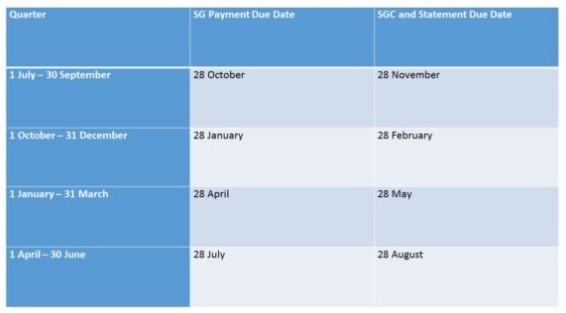Our Taxation team at Pointon Partners are often asked to advise on whether employers are obliged to pay superannuation for the services of a contractor for the purposes of the Superannuation Guarantee Act when a dispute has arisen. This has been highlighted by recent ATO activity where disgruntled contractors have been claiming superannuation via the ATO, and a recent Federal Court case, which defined again the difference between a contractor and an employee for superannuation purposes. Further, the National Employee Standards via the Work Legislation Amendment (Protecting Workers Entitlements) Bill 2023 enables certain employees to sue for their unpaid superannuation in addition to relying on the ATO's ability to pursue under the Superannuation Guarantee Charge. The implications dealt with here are significant and can have adverse tax consequences on businesses that employ workers where the business misidentified workers as the liabilities can be claimed for many earlier years. This article will deal with the main issues that employers should take into account when assessing their contracts with workers such as:
- Determining whether a worker is an employee or contractor;
- What is the time frame within which the ATO can take action in cases where an employer neglects to fulfil their superannuation payment obligations
- Penalties that will arise on failure to meet superannuation obligations;
- The ATO's power to remit a taxpayer's failure to pay superannuation;
- Potential action that can be taken by a worker for failure to pay superannuation; and
- Determining whether your worker is an employee or contractor under the Superannuation Guarantee Act
Part of recognising when to pay superannuation is distinguishing between whether you currently use employees or contractors to carry on your business. This issue was explored in the recent case of Jamsek v ZG Operations Australia Pty Ltd (No 3) [2023] FCAFC 48.
The key issue in this case was whether the workers were employees or contractors under section 12(3) of the Superannuation Guarantee (Administration) Act 1992 which provides for the statutory definition of an employee. Employers should note that due to the ambit of section 12(3), the definition is considerably wider than the common law definition of an employee:
"If a person works under a contract that is wholly or principally for the labour of the person, the person is an employee of the other party to the contract"
While employers may be using contractors in the ordinary sense to carry on their business, they may be employees under section 12(3) and may be required to pay superannuation for said contractors. The Full Federal Court, in its handling of the remitted matter from the High Court, examined three crucial factors for determining an individual's classification as either an employee or a contractor under section 12(3).
Contract Element – Natural Person
It is clear from the wording of 12(3) that there must be a contract, however the court also outlined that the contract must be between the employer and a natural person. This requires that the contract must identify an individual, the employee, who is party to the contract in their personal capacity. In Jamsek, this requirement was not met as the contract specified the partnership rather than the individuals that comprised the partnership.
Principally "for" element – Not Result
The contract for an employee must also be principally or wholly for the purpose of the personal labour and skills of the individual as opposed to the individual achieving a result. This distinction is essential as ordinarily, employees are employed principally for their labour whereas contractors are typically used to achieve a result as per SGR 2005/1. While the distinction between a contract for labour or to achieve a result may be ambiguous, the court in Jamsek outlined the following factors will be relevant in determining what the contract is for. This includes assessing the following
- the contract was for the provision of labour and equipment to achieve a given result; – contractor
- the individuals used to carry on the business were provided remuneration based on the hours that they worked; – employee
- the individuals were required to provide their own assets for the contract; – contractor
- if the individuals had the power to delegate their work to others; – contractor
- if the labour component specified in the contract was the principal benefit reaped by the employer. – employee
The person must "work" under the contract
The individual must work under the contract, and the other side must make payment to the person in respect of their labour under the contract. This would be clear on the facts.
- Obligation to pay Superannuation Guarantee has no time limit
A payment request outside 5 years is not usually acted upon by the ATO in practice. This is because employers are not expected to keep their superannuation guarantee charge statements for more than 5 years after the statement is lodged.
However there is no statutory limit on how far back the ATO can go when conducting Superannuation Guarantee audits on the employer. If the ATO receives a complaint from an employee with original payment summaries or income statements for the years in question and superannuation fund statements for the enquiry period, the ATO will act on this regardless how far back the issue extends. The starting point is generally a request of the employer for their records in respect of the complainant and a copy of the contract.
- Superannuation Guarantee Charge and other Penalties
If an employer fails to make the minimum Superannuation Guarantee contributions to employees by the deadline, they will attract liability from the Superannuation Guarantee Charge. This amount is payable to the ATO rather than the super fund and is not deductible.
The SGC is made up of three parts including:
- The SG shortfall made up of
- SG calculated on salary and wages (including any overtime)
- Any choice liability, based on the shortfall and capped at $500
- Nominal interest of 10% per annum (accrues from the relevant quarter)
- An administration fee of $20 per employee, per quarter.
Please see below for when the Superannuation Guarantee payment and statements are due.

Additionally, employers may also be liable for penalties other than the SGC. These include:
- Administrative Penalties: This can be up to 75% of the shortfall to the employee's superannuation or the ATO may vary this depending on your situation.
- Director Penalties: Failure to pay Superannuation Guarantee in full may lead to the ATO recovering the owed monies from directors directly. The ATO may action this by issuing a director penalty notice or withholding a tax refund.
- General Interest Charges: An additional charge which continues to accrue until the employer pays the SGC in full. This is calculated on a daily compounding basis and is not tax deductible.
- Choice Shortfall: Occurs if you do not comply
with your choice of fund obligations. This will apply if you:
- Do not give your eligible employee a Superannuation standard choice form within the required timeframe;
- Pay your eligible employee's super to a complying fund but not the fund they chose or not their stapled super fund; or
- Charge your employee a fee for implementing their choice of fund.
- Failing to keep adequate records: The maximum fine for an individual failing to keep records is 30 penalty units ($5,769.30). An administrative penalty of 20 penalty units ($3,846.20) may also apply on top of this.
- Failure to provide employee's TFN to super fund: If your employee has provided you with their TFN but you do not provide it to the super fund within the required time, you may be liable for 10 penalty units ($1,923.10)
- ATO's Power to remit failure to pay superannuation
Recently, the ATO has issued the Taxation Administration (Remedial Power – Remission of Charges and Penalties) Determination 2023 which codifies its longstanding practice of remitting interest or penalties for certain classes of taxpayers. These classes include any individual or group:
- That the Commissioner believes has been affected by a natural disaster or other serious and external adverse events that adversely affect the ability of the taxpayer to meet their obligations on time;
- Where the Commissioner believes that the cost of collecting the amount owing is greater than the amount to be collected; or
- That the Commissioner considers is appropriate to remit to encourage compliance with taxation obligations with regard to the taxpayer's previous compliance history with their obligations.
Hence, the ATO may remit some or all of the penalties outlined beforehand if the taxpayer is part of the three classes outlined.
- Superannuation now enshrined in the National Employment Standards
Employers should note the recent amendments to the Fair Work Act 2009 introduced by the Fair Work Legislation Amendment (Protecting Worker Entitlements) Bill 2023. In the past, shortfalls in superannuation payments could only be enforced through the Commissioner of Taxation rather than the employee personally via the earlier described process concerning the Super Guarantee Charge. The amendments now allow employees to personally pursue their employers for any unpaid superannuation contributions such that employers will also be exposed to civil penalties, where the ATO has not pursued a Super Guarantee Charge an no Super Guarantee Charge has been paid.
However, the National Employment Standards apply only to common law employees. It appears that these amendments will not affect the situation of independent contractors who are employees under section 12(3) of the SGA Act. In the case for contractors who are owed superannuation, the only route for them to enforce their rights is through the Commissioner of Taxation alone.
Key Takeaways
- Employers should review their agreement with contractors and whether they would be caught under section 12(3) of the Superannuation Guarantee Act and for payroll tax, taking into account the issues raised in Jamsek;
- The ATO does not have a limited period in which they can act on an employer's failure to pay superannuation, and employers with concern should assess their potential liability for the period of each individual;
- Further penalties can apply to employers who fail to pay superannuation;
- The ATO may remit penalties for good taxpayers;
- Employees may under recent legislative changes under the Fair Work Act 2009 personally take action against employers for failure to pay superannuation; and
- Where a repayment of a SGC is required, the contractual right to recover from an individual should be assessed for any overpayment under the contract
The content of this article is intended to provide a general guide to the subject matter. Specialist advice should be sought about your specific circumstances.


